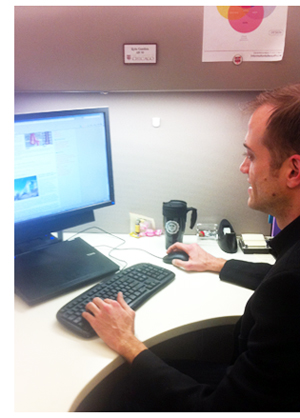| Sun | Mon | Tue | Wed | Thu | Fri | Sat |
|---|---|---|---|---|---|---|
| 1 | 2 | 3 | 4 | 5 | ||
| 6 | 7 | 8 | 9 | 10 | 11 | 12 |
| 13 | 14 | 15 | 16 | 17 | 18 | 19 |
| 20 | 21 | 22 | 23 | 24 | 25 | 26 |
| 27 | 28 | 29 | 30 | 31 |
CATEGORIES
RECENT ENTRIES
BLOG ROLL
Job satisfaction
A recent ranking highlights an obscure, but apparently well-satisfied, career path.
 It always takes a little extra effort to explain what I do for a living. “I work for the University of Chicago,” I’ll say, to be quickly followed by, “No, I’m not faculty, or a researcher, or a doctor or nurse—I work in one of the administrative offices.” Technically speaking, the Department of Labor would classify many of the University’s staff, likely including myself, as “education administrators”, those workers who “set educational standards and goals and establish the policies and procedures required to achieve them. They also supervise managers, support staff, teachers, counselors, librarians, coaches, and other employees. They develop academic programs, monitor students’ educational progress, train and motivate teachers and other staff, manage career counseling and other student services, administer recordkeeping, prepare budgets, and perform many other duties. They also handle relations with parents, prospective and current students, employers, and the community.”
It always takes a little extra effort to explain what I do for a living. “I work for the University of Chicago,” I’ll say, to be quickly followed by, “No, I’m not faculty, or a researcher, or a doctor or nurse—I work in one of the administrative offices.” Technically speaking, the Department of Labor would classify many of the University’s staff, likely including myself, as “education administrators”, those workers who “set educational standards and goals and establish the policies and procedures required to achieve them. They also supervise managers, support staff, teachers, counselors, librarians, coaches, and other employees. They develop academic programs, monitor students’ educational progress, train and motivate teachers and other staff, manage career counseling and other student services, administer recordkeeping, prepare budgets, and perform many other duties. They also handle relations with parents, prospective and current students, employers, and the community.”
So it was nice to see my relatively obscure occupation highlighted in U.S. News & World Report’s recent list of “the 50 Best Careers of 2011,” a ranking that highlighted high-opportunity professions in the coming year based on job-growth projections, salary data, and other factors such as job satisfaction. It was that last factor—job satisfaction—that got "education administrator" added to the list. Although a few other lesser-known jobs such as "gaming manager" and "hydrologist" appear as well, the majority of the top 50 are more easily recognizable, such as "accountant" or "curator". Nearly half are in either the health-care or high-tech fields. Appropriately enough, the job-satisfaction data came from the National Opinion Research Center at the University of Chicago (NORC). Its 2007 study, “Job Satisfaction in the United States,” (pdf) lists the top 12 and bottom 12 professions in each of two categories, job satisfaction and “general happiness,” which would seem to beg the question of whether one affects the other.
Education administrator comes in fourth for job satisfaction, behind clergy, physical therapists, and firefighters. “Painter, sculptor, related” rounds out the top five. Those satisfied clergy and firefighters also top the list for general happiness, but my fellow education administrators and I, along with the physical therapists, painters, and sculptors, don’t even make the top 12. On the other hand, careers such as architecture and “transportation ticket and reservation agents” must attract inherently happy people, because they appear in the top five for general happiness without appearing in the top 12 for job satisfaction.
Some of the study’s findings are no surprise—many of the bottom professions in both categories are known for hard work and low wages, such as construction laborers and food preparers—while in other cases it seems that a small change can make a big difference. Considering a career in retail? Think Home Depot before H&M: hardware/building-supplies salespersons are the 11th happiest, but apparel clothing salespersons are the seventh least satisfied in their jobs. Good at fixing things? Think Toyota, not Toshiba: mechanics are the eighth happiest, but electronic repairers the tenth-least happy. In at least one field, a promotion can apparently make all the difference: “maids and housemen” are the eighth least happy, but their supervisors, “housekeepers and butlers,” are the 12th happiest.
Perhaps my colleagues and I should consider transferring to another field well represented here at the University; the “science technicians” who work in the many laboratories on campus may not have our job satisfaction, but they’re nonetheless the seventh happiest occupation. At least it would be easier to explain to people what we do for a living.
Kyle Gorden, AB'00
January 3, 2011
